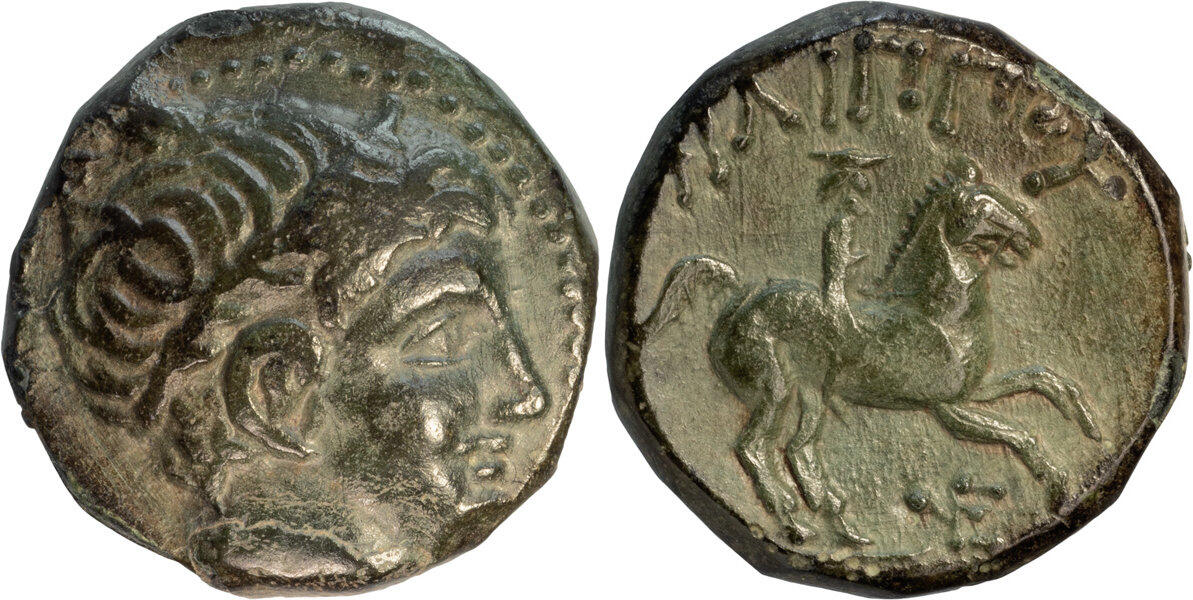3609 - Leucas (AE Chimera/Athena) over Philip II (Apollo/rider) (Münzen & Medaillen, 17, Oct. 2005, 618)
From SILVER
300 BCE - 270 BCE | Λ
Location/history
| Sale(s)Sale(s) ᵖ: | Münzen & Medaillen, Liste 193, 1959, 7 = Münzen & Medaillen, 79, 1994, 268 = Münzen und Medaillen, 17, 4 Oct. 2005, 618 | |
Overstriking coin
Description
| ObverseInscription or printing placed on the obverse.: | Chimera left. | ReverseInscription or printing placed on the reverse.: | Λ (Greek) Head of Athena left, wearing Corinthian helmet. |
Mint and issuing power
| MintIdentifies the place of manufacture or issue of a numismatic object.: | Leucas | Ancient regionAncient region. | Acarnania | Modern countryModern country: Greece | AuthorityIdentifies the issuing power. The authority can be "pretended" when the name or the portrait of X is on the coin but he/she was not the issuing power. It can also be "uncertain" when there is no mention of X on the coin but he/she was the issuing power according to the historical sources: |
Chronology
| FromIdentifies the initial date in a range assigned in a numismatic context. 300 BCE toIdentifies the final date in a range assigned in a numismatic context.. 270 BCE | Hellenistic 323-30 BC |
Physical description
| MetalThe physical material (usually metal) from which an object is made.: Bronze |
WeightWeight of the numismatic object (in grams). in grams: 6.156.15 g <br />6,150 mg <br /> | ||
| DiameterDescribes diameter of an object (in mm).: 2020 mm <br />2 cm <br /> | |||
References
| Coin referenceReference of the Coin: | https://www.acsearch.info/search.html?id=250305 | Coin series referenceReference to coin series study: | SNG Copenhagen 31SNG Copenhagen 3, n°367, BMC Thessaly2BMC Thessaly, n° 1-10, p. 174, HGC 43HGC 4, n° 859 |
| Coin series web referenceCoin series web references: | |||
Overstruck type
Description
| ObverseInscription or printing placed on the obverse.: | Head of Apollo l., wearing laurel wreath. | ReverseInscription or printing placed on the reverse.: | ΦΙΛΙΠΠΟΥ Horseman right. |
Mint and issuing power
| MintIdentifies the place of manufacture or issue of a numismatic object. ᵖ: | Macedonia (uncertain mint) | Ancient regionAncient region. ᵖ | Macedon | Modern countryModern country: Greece | AuthorityIdentifies the authority in whose name (explicitly or implicitly) a numismatic object was issued. ᵖ: | Philip II (Argead king, 359-336 BC) |
Chronology
| FromIdentifies the initial date in a range assigned in a numismatic context. 359 BCE toIdentifies the final date in a range assigned in a numismatic context.. 336 BCE | Classical 480-323 BC |
Physical description
References
| Coin type referenceReference to coin series study ᵖ: | SNG ANS 8 Macedonia 24SNG ANS 8 Macedonia 2, n° 919, HGC 3.15HGC 3.1, n° 883 |
Additional data
| Frequency of overstrikesFrequency of overstrikes: | frequent | Level of confidenceLevel of confidence of the identification: | strong |
| RemarksRemarks: | "überprägt auf eine Bronze des Philippos II" | ||
References
- ^ SNG Copenhagen 3. Thessaly-Illyricum. Epirus-Acarnania. Aetolia-Euboea. Attica-Aegina. Corinth. Philiasia-Laconia. Argolis-Aegean Islands, Copenhagen, 1982.
- ^ Gardner, Percy (1883), A Catalogue of the Greek coins in the British Museum. vol. V : Thessaly to Aetolia, London, The Trustees, p. 234, pl. 32.
- ^ Hoover, Oliver D. (2014), Handbook of Greek Coinage Series 4. Northern and Central Greece : Achaia Phthiotis, Ainis, Magnesia, Malis, Oita, Perrhaibia, Thessaly, Akarnania, Aitolia, Lokris, Phokis, Boiotia, Euboia, Attica, Megaris and Corinthia, sixth to first centuries BC, Lancaster, lxxi, 563 p.
- ^ Troxell, Hyla A. (1994), Sylloge Nummorum Graecorum ANS 8. The Collection of the American Numismatic Society. Macedonia 2. Alexander I - Philip II, New York
- ^ Hoover, Oliver D. (2016), Handbook of coins of Macedon and its neighbors. 3. Part I: Macedon, Illyria, and Epeiros, sixth to first centuries BC, Lancaster, 437 p.

